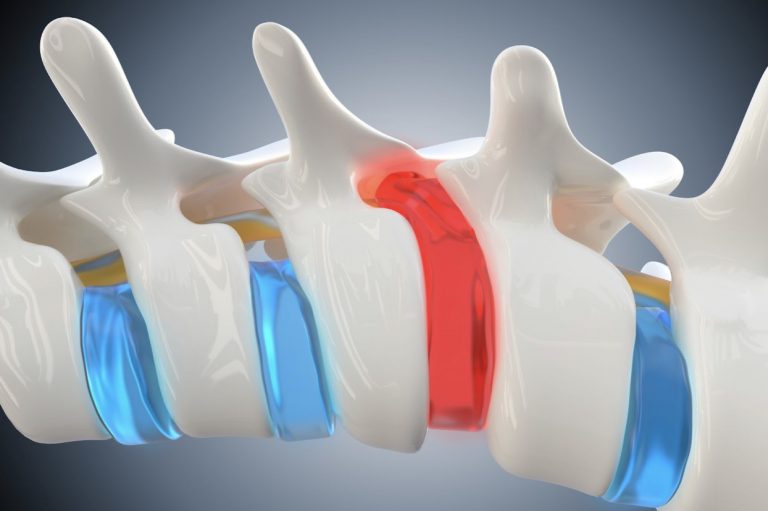Bulging discs are a very common condition, affecting millions every year. Related to natural aging that affects everyone, a bulging disc occurs when a spinal disc bulges out of its normal position.
The discs, which are shock absorbers, lose elasticity due to drying out. A bulging disc is distinct from a herniated disc, where inner disc material pushes out through a tear or rupture. Instead, bulging discs are when the outer layer stays intact.
A bulging disc is not always painful but can develop painful symptoms if the pinches a nerve. Bulging disc symptoms include local neck or back pain, shooting pain, leg pain, tingling, numbness, and muscle weakness.
In severe cases, a bulging disc can cause pain that reduces the quality of life. People with bulging disc pain can find it difficult to function at work or while performing everyday activities around the house. Many people in this situation wonder if surgery to treat a bulging disc is the best option.
To help answer this important question, the experts at BEST Health System have created the following informative guide. As you read this over, we invite you to reach out to one of our caring representatives if you have any questions or are interested in learning more about your treatment options.
Bulging disc treatment typically begins with basic options
Except in rare circumstances, most with a painful bulging disc first attempt nonsurgical therapies to treat the spinal disc condition. Certain symptoms, such as severe pain, complete numbness, loss of motor skills, and urinary or bowel incontinence, may be a sign of cauda equina syndrome caused by a bulging disc. This rare condition requires immediate surgery. Anyone experiencing one or more of the above symptoms should seek immediate medical attention.
As an age-related condition, the underlying causes of bulging discs are not reversible. The spinal discs themselves receive relatively low blood flow, meaning that injuries and conditions affecting them are very slow to heal. This is why the primary goal of conservative treatment is to relieve and manage pain while also taking steps to improve spinal function and reduce pressure on the discs.
Options to relieve and manage pain include:
- Over-the-counter medication, such as nonsteroidal anti-inflammatory drugs (NSAIDs)
- Cold therapy, such as an ice pack, to reduce inflammation and numb the area
- Heat therapy, such as a heating pad, to relieve tense muscles and improve blood flow
- Pain management injections to relieve pain and inflammation on a long-term basis
Doctor-recommended methods for improving function and reducing pressure on the spinal column include:
- Periods of rest, as needed
- Modifying activities to reduce pressure on the spinal disc
- Moderate exercise to help strengthen core muscles and assist with weight management
- Posture improvement to evenly distribute weight and reduce stress on the bulging disc
- Physical therapy to address movement issues, functional problems and to strengthen supporting muscles
Committing to long-term treatment and a spine-healthy lifestyle
Bulging disc surgery is usually a last resort, which is why patients should be prepared to explore all available options. It is also essential to optimize your spine health through healthy choices that support the spine and relieve pressure on spinal discs.
As shock absorbers, these rubbery pieces of cartilage absorb high amounts of stress, which is part of the reason why they bulge out of place. While no one can reverse the natural forces that cause the spinal discs to bulge, making the following healthy choices can help slow them down while reducing stress on your discs:
- Moving more and avoiding being sedentary
- Eating a nutrient-rich anti-inflammatory diet
- Practicing good posture
- Maintaining a healthy weight
- Avoiding tobacco
By committing to treatment and practicing a healthy lifestyle, many people with a bulging disc enjoy a good quality of life without undergoing surgery.
Considerations for bulging disc surgery
If weeks or months go by without an improvement in symptoms and you have explored all options, many will seriously consider surgery. It’s important that a potential surgeon positively identifies the bulging disc as the source of symptoms through a thorough evaluation. Diagnostic tests, such as nerve blocks, movement tests, and an MRI, can help rule out other problems.
Once a bulging disc is identified as the cause of symptoms, it is also important to make plans for recovery. Bulging disc surgery, such as a discectomy, can be performed on an outpatient basis thanks to the continued development of minimally invasive spine surgery. This helps reduce the recovery time and lower the risk of certain complications compared to traditional open spine surgery.
BEST Health System is an advanced specialist in bulging disc treatment. Whether you are exploring therapies such as steroid injections or seriously considering surgery, our experts can help you develop a personalized treatment plan. We’re passionate about helping people reclaim their lives and get back to the people and activities they love.
Contact us today to learn more about how we can help.
